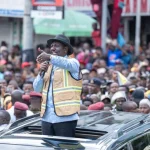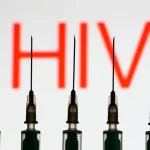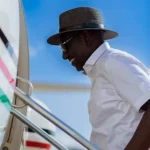ODM Leaders Go After Gachagua Amid Raila’s Ill-Health Rumours: “Who Told Him He is Sick?”
The Spark: Rumours and Allegations
Rumours about the health of Raila Odinga, long-time leader of the ODM party, have been circulating in Kenyan media and among political players. These rumours seemingly gained traction when Raila was absent from public view for a period. In response, Rigathi Gachagua has made statements questioning the transparency around Odinga’s whereabouts and whether his health status is being communicated properly. Kenyans+2Nairobi Leo+2
ODM leaders, including Homa Bay Governor Gladys Wanga and MP Rose Buyu, have publicly rebuked Gachagua’s comments, calling them divisive and accusing him of using Raila’s health as political fodder. Buyu, for example, asked pointedly: “Who told him Raila is sick?” Tuko.co.ke – Kenya news.
ODM’s Formal Denials
Raila’s secretariat, through his spokesperson Dennis Onyango, issued statements dismissing the rumours as false, malicious, and politically motivated. They clarified that Odinga is in good health, currently in the United Kingdom, and continuing his official duties. Nairobi Wire+3The Times+3The Standard+3
The secretariat also alleged that some of the rumours were spread using AI-generated images or media posts amplified by bloggers and sympathetic platforms. The Times+2Nairobi Wire+2
Gachagua’s Defence & Position
Rigathi Gachagua has responded by distancing himself from direct culpability. He claimed he was unaware of social media rumours, that on the relevant day he was not using social media and was spending time outside political activity. He expressed sadness at being dragged into the controversy. Nairobi Leo
He argued that if a leader is truly well, visible actions—public appearances—would suffice to dispel rumours instead of issuing formal denials. He also criticised the ODM leadership’s handling of the situation as “amateurish”. Kenyans+1
Other Players: Kalonzo & Wiper’s Response
Wiper Party, led by Kalonzo Musyoka, has also been mentioned in ODM’s accusations. ODM claims Kalonzo, along with Gachagua and Eugene Wamalwa, are involved in spreading false claims for political leverage. Nairobi Wire+2The Times+2
In turn, Wiper has strongly denied these allegations. Kalonzo’s party stated that any suggestion of wishing ill on Raila is false and malicious. Wiper also accused ODM of using the rumours as a distraction from its internal challenges. Nairobi Wire+1
What This Reveals: Politics, Rumour & Strategy
-
Political Weaponization of Rumour: In Kenyan politics, rumours—especially about health—can undermine credibility. Accusations levied over Raila’s health seem less about concern, more about scoring political points.
-
Visibility vs Absence: Leaders’ absence from public view tends to fuel speculation. Gachagua’s call for visible appearances underscores how in politics, optics matter.
-
Strained Opposition Dynamics: The fallout reveals cracks in the opposition coalition. Accusations between ODM and Wiper indicate tension not just with political rivals, but among purported allies.
-
Media, Misinformation & Social Media: Claims about AI-generated images, bloggers, and amplified reports suggest there’s a growing concern about fake news / misinformation, and how it is used in political narratives.
Implications Ahead of 2027
-
Trust & Credibility: These health rumours could erode public trust in political actors, especially if people feel they are being manipulated.
-
Electoral Strategy: Politicians may use rumours and counter-rumours as early tools of shaping narratives leading into the 2027 election. Whoever controls the narrative early could have leverage.
-
Call for Transparency: The backlash suggests a public expectation that leaders communicate clearly about health and absence; silence or ambiguity is politically costly.
Conclusion
The recent clash between ODM leaders and Rigathi Gachagua over rumours about Raila Odinga’s health is more than personal—it’s political. What started as speculation has become a prism reflecting deeper issues: rivalries within the opposition, the power of media narratives, and the high stakes ahead of 2027.
“Who told him he is sick?” isn’t just a rhetorical question—it’s a probe into whose agenda is being served, and how rumours can either erode or build political narratives.








